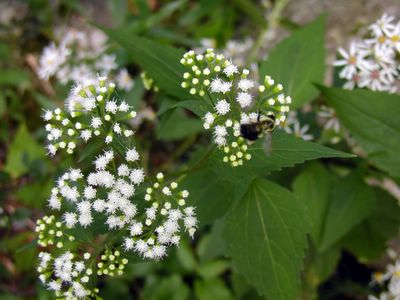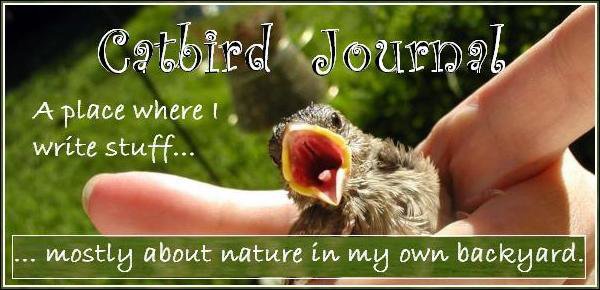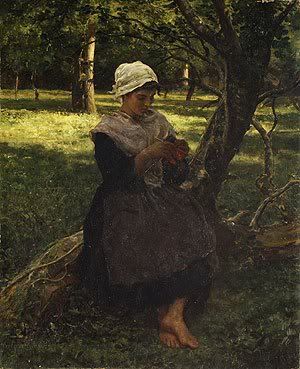Labor Day.
There are some things I’d like to say about Labor Day.
Now, normally I’d like to rant about unions, the labor movement, how much we owe to them, globalization, the minimum wage, the breakup of the AFL-CIO, etc etc. But I think I’ll skip that for now. Instead, I want to write about unpaid labor. I may do it in a roundabout way, I’m going to ramble. so bear with me.
The other day I found that there is a very abundant weed down by the creek, it’s very pretty, and it has tiny white flowers all over it. I was curious, so I turned to my field guides and tried to figure out what it was. At first I thought it might be boneset, a very useful medicinal plant. But after some more research, I figured out that it is actually a relative of boneset – white snakeroot. It, too, has been used as a medicine, but I prefer not to mess with it since it can also be toxic. Abraham Lincoln’s mother died of “milk fever” which was caused by drinking milk from a cow that has eaten white snakeroot. I guess this was a common illness that killed people in earlier times.
 Still, it is a pretty plant and it’s interesting to learn about it. I also now know how to recognize boneset, and how to use it, should I find some. Most importantly, I know how to distinguish it from its more dangerous relative, white snakeroot.
Still, it is a pretty plant and it’s interesting to learn about it. I also now know how to recognize boneset, and how to use it, should I find some. Most importantly, I know how to distinguish it from its more dangerous relative, white snakeroot.
I am a librarian by trade, so research is how I earn my living. But this research I did just for my own curiosity’s sake. Was this “work”? Or “play”?
I met my friend Chris in college. He was an art student back then, full of ego and covered with oil paint at all times. To go to an art museum with him was fascinating. He pointed out brushstrokes, composition, told me about the lives and careers of many artists, talked about how their work was received at the time and how it influenced future artists etc. I learned a lot from him.
Chris went on to graduate and become an artist. At times, he was able to make a living selling his work, but most of the time he had other jobs to help him pay for paint, canvas and brushes. Once I went to visit him in Seattle, where he was living. He and his wife lived in a large warehouse/loft type of space, with his paintings covering the walls and with no real kitchen or bathroom. Chris was in his mid-thirties by then, and feeling the pressure that men especially feel in our culture to “grow up”, get a “real job” and stop “pretending to be an artist”.
Shortly after that Chris did decide to take a break from the artist’s life and do something different. Now he teaches Tai Chi, which he also really enjoys. One thing I have noticed about Chris is that he’s gained a lot of wisdom and humility over the time that I've known him. I asked him in a phone conversation a few years ago if he had given up on his art. He said: “I decided that art is for me, but the art world is not for me”.
During this phone conversation we talked about herbal medicine. He described finding boneset growing in an empty lot, and collecting it for use in the winter to help his immune system fight colds and flu. He said: “When I look at boneset, I see a plant that has so many uses, but to most people, it’s just a weed growing in an empty lot. I feel like boneset myself. I have so many uses that society may not value or understand.” I knew just what he meant.
We all have parts of ourselves that we know are valuable, but will this particular capitalist system pay for these things? And if we aren’t paid for them, do they have any “value” to those around us? Are they “work” or “play”?
My step-daughter, Glenda, is pregnant and due to give birth at any moment. I think it would be cool if her baby was born on Labor Day, just because. Is giving birth, is parenting part of the gross national product?
I love to knit and I have two knitting books that I love very much. Both are by the same author, Robin Hansen. The titles are: Fox & Geese & Fences and Flying Geese & Partridge Feet.
They describe the humble task of knitting warm mittens and hats for people who labored outdoors in a cold climate. Some of these techniques are used very little anymore, and may be lost.
The author conducted oral history interviews of older women (and a few men) in the maritime provinces of Canada and Maine in the US. She asked them to show her the knitting techniques passed down to them by their ancestors. She traces how certain areas used certain patterns and techniques and how the different ethnic groups (Scandinavian, English, Irish, etc) influenced knitting in the areas she studied. She visited museums and shows pictures of mittens that you probably don’t see much today.
For example, mittens with tufts of wool roving lining the inside - often used by loggers, big bulky mittens with thick shag (kind of like shag carpet) on the inside or the outside - used to drive a horse drawn sleigh in winter, giant mittens boiled in salt water and shrunk down, worn wet to haul fishing line from the freezing winter ocean, “wristers” that were worn underneath mittens to keep the wrists warm when a person had to take the thicker, bulkier mitten off to do some work requiring more manual dexterity, etc etc.
All the labor involved. All the work people did with their hands. All the knowledge lost. All the connections between generations lost as people no longer value that knowledge. All the human creativity and innovation that was put into such simple everyday things. All the hours and hours spent to make these things. Now what are they? Who cares anymore?
Did the woman who wrote these books make much money from hours of interviewing people, learning and mastering the techniques, writing about it? She was curious; she didn’t want this knowledge to be lost. She wanted to write it. She got it published. But my guess is, they weren't bestsellers. Theya re out of print now. At one time this kind of labor and skill could have been a life or death matter. Now, to write such a book, is it work or play?
On vacation we went to the Adirondack Museum. Buildings and rooms full of artifacts that were once everyday, ordinary items. Each handmade. The hands that made and used those items are gone. Now they are curiosities. There is something about this that makes me so angry, and really -- envious.
Why was I born in a time where all of our objects are mass produced? Why is people’s “labor” now in factories in other countries, for such low wages, surrounded by barbed wire, not even allowed to take a bathroom break, screamed at and humiliated, fired if they talk of a union. Why do we have to feel this guilt and shame when we touch any plastic thing, or any item of clothing, knowing the hands that made it were basically the hands of slaves?
Why isn’t there the pride of figuring out a better way to make something, craftsmanship, passing on that knowledge and skill to another?
Why is our own labor, the labor that we are paid to do, often so empty, abstract and disconnected from our true selves? We workers have no control of the means of production.
When I knit, when I learn about and use herbal medicine, when I track and animal to hunt, when I garden, when I preserve food for winter, when I study animal behavior I labor with love. But love doesn’t pay the bills.
Right now, my husband calls upstairs that I should come downstairs and fold the laundry. I have stolen an hour to think about this, to write this.
Was this work? What is work?
Now, normally I’d like to rant about unions, the labor movement, how much we owe to them, globalization, the minimum wage, the breakup of the AFL-CIO, etc etc. But I think I’ll skip that for now. Instead, I want to write about unpaid labor. I may do it in a roundabout way, I’m going to ramble. so bear with me.
The other day I found that there is a very abundant weed down by the creek, it’s very pretty, and it has tiny white flowers all over it. I was curious, so I turned to my field guides and tried to figure out what it was. At first I thought it might be boneset, a very useful medicinal plant. But after some more research, I figured out that it is actually a relative of boneset – white snakeroot. It, too, has been used as a medicine, but I prefer not to mess with it since it can also be toxic. Abraham Lincoln’s mother died of “milk fever” which was caused by drinking milk from a cow that has eaten white snakeroot. I guess this was a common illness that killed people in earlier times.
 Still, it is a pretty plant and it’s interesting to learn about it. I also now know how to recognize boneset, and how to use it, should I find some. Most importantly, I know how to distinguish it from its more dangerous relative, white snakeroot.
Still, it is a pretty plant and it’s interesting to learn about it. I also now know how to recognize boneset, and how to use it, should I find some. Most importantly, I know how to distinguish it from its more dangerous relative, white snakeroot.I am a librarian by trade, so research is how I earn my living. But this research I did just for my own curiosity’s sake. Was this “work”? Or “play”?
I met my friend Chris in college. He was an art student back then, full of ego and covered with oil paint at all times. To go to an art museum with him was fascinating. He pointed out brushstrokes, composition, told me about the lives and careers of many artists, talked about how their work was received at the time and how it influenced future artists etc. I learned a lot from him.
Chris went on to graduate and become an artist. At times, he was able to make a living selling his work, but most of the time he had other jobs to help him pay for paint, canvas and brushes. Once I went to visit him in Seattle, where he was living. He and his wife lived in a large warehouse/loft type of space, with his paintings covering the walls and with no real kitchen or bathroom. Chris was in his mid-thirties by then, and feeling the pressure that men especially feel in our culture to “grow up”, get a “real job” and stop “pretending to be an artist”.
Shortly after that Chris did decide to take a break from the artist’s life and do something different. Now he teaches Tai Chi, which he also really enjoys. One thing I have noticed about Chris is that he’s gained a lot of wisdom and humility over the time that I've known him. I asked him in a phone conversation a few years ago if he had given up on his art. He said: “I decided that art is for me, but the art world is not for me”.
During this phone conversation we talked about herbal medicine. He described finding boneset growing in an empty lot, and collecting it for use in the winter to help his immune system fight colds and flu. He said: “When I look at boneset, I see a plant that has so many uses, but to most people, it’s just a weed growing in an empty lot. I feel like boneset myself. I have so many uses that society may not value or understand.” I knew just what he meant.
We all have parts of ourselves that we know are valuable, but will this particular capitalist system pay for these things? And if we aren’t paid for them, do they have any “value” to those around us? Are they “work” or “play”?
My step-daughter, Glenda, is pregnant and due to give birth at any moment. I think it would be cool if her baby was born on Labor Day, just because. Is giving birth, is parenting part of the gross national product?
I love to knit and I have two knitting books that I love very much. Both are by the same author, Robin Hansen. The titles are: Fox & Geese & Fences and Flying Geese & Partridge Feet.
They describe the humble task of knitting warm mittens and hats for people who labored outdoors in a cold climate. Some of these techniques are used very little anymore, and may be lost.
The author conducted oral history interviews of older women (and a few men) in the maritime provinces of Canada and Maine in the US. She asked them to show her the knitting techniques passed down to them by their ancestors. She traces how certain areas used certain patterns and techniques and how the different ethnic groups (Scandinavian, English, Irish, etc) influenced knitting in the areas she studied. She visited museums and shows pictures of mittens that you probably don’t see much today.
For example, mittens with tufts of wool roving lining the inside - often used by loggers, big bulky mittens with thick shag (kind of like shag carpet) on the inside or the outside - used to drive a horse drawn sleigh in winter, giant mittens boiled in salt water and shrunk down, worn wet to haul fishing line from the freezing winter ocean, “wristers” that were worn underneath mittens to keep the wrists warm when a person had to take the thicker, bulkier mitten off to do some work requiring more manual dexterity, etc etc.
All the labor involved. All the work people did with their hands. All the knowledge lost. All the connections between generations lost as people no longer value that knowledge. All the human creativity and innovation that was put into such simple everyday things. All the hours and hours spent to make these things. Now what are they? Who cares anymore?
Did the woman who wrote these books make much money from hours of interviewing people, learning and mastering the techniques, writing about it? She was curious; she didn’t want this knowledge to be lost. She wanted to write it. She got it published. But my guess is, they weren't bestsellers. Theya re out of print now. At one time this kind of labor and skill could have been a life or death matter. Now, to write such a book, is it work or play?
On vacation we went to the Adirondack Museum. Buildings and rooms full of artifacts that were once everyday, ordinary items. Each handmade. The hands that made and used those items are gone. Now they are curiosities. There is something about this that makes me so angry, and really -- envious.
Why was I born in a time where all of our objects are mass produced? Why is people’s “labor” now in factories in other countries, for such low wages, surrounded by barbed wire, not even allowed to take a bathroom break, screamed at and humiliated, fired if they talk of a union. Why do we have to feel this guilt and shame when we touch any plastic thing, or any item of clothing, knowing the hands that made it were basically the hands of slaves?
Why isn’t there the pride of figuring out a better way to make something, craftsmanship, passing on that knowledge and skill to another?
Why is our own labor, the labor that we are paid to do, often so empty, abstract and disconnected from our true selves? We workers have no control of the means of production.
When I knit, when I learn about and use herbal medicine, when I track and animal to hunt, when I garden, when I preserve food for winter, when I study animal behavior I labor with love. But love doesn’t pay the bills.
Right now, my husband calls upstairs that I should come downstairs and fold the laundry. I have stolen an hour to think about this, to write this.
Was this work? What is work?




3 Comments:
what a thoughtful and thought provoking post. for me, writing and thinking have always been the "great unpaid endeavor" ... but I've found that I was paid all those hours, just not in currency that I could recognize then. Life is one big unpaid endeavor, unless you realize how rich it is in unrecognizable currency, the wealth of spiritual growth (forgive me). My big deal now in this vein is to give my blog the value it is due in unpaid currency ... and to keep remembering who I do it for, and not become a panderer for others' entertainment. sorry for the length of this comment. thank you for this post. xoxo
Great post, Kate, and you bring up some excellent questions. Of course, I have no answers, but you've given me quite a lot to ponder!
Yay, great post!
g
Post a Comment
<< Home